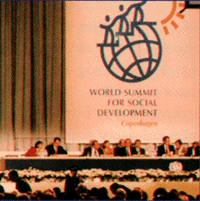Development
Making progress in development is essential not only for improving the quality of life of all people but also for achieving world peace and stability toward the 21st century. The United Nations has a crucial role to play in development and Japan strives to revitalize the U.N.'s development programs.

Then-Prime Minister Tomiichi Murayama delivers a speech at the World Summit in March 1995.
Need for a New Approach
-A New Global Partnership-
During the Cold War, the relationship between South and North was characterized by political confrontation based on continuing ideological rivalry. Now that the Cold War has ended, conditions exist for tackling the problems of development. Unfortunately, in discussions at the U.N. and elsewhere, both developed and developing countries have failed to break free of the pattern of confrontation so that they can move on to more substantive discussions. That is why the Government of Japan emphasizes the idea of a "new global partnership" on different occasions, including in the discussions of the Working Group on an Agenda for Development established by the U.N. General Assembly and also in the Lyon Summit. The idea behind the "new global partnership" is that it is necessary for developed and developing countries to escape the grip the past has on them and cooperate to achieve real progress toward development.
Achieving Results-Reducing Poverty, Progress in Primary Education, Cutting Infant and Child Mortality, etc.
On tackling the issue of development based on the "new global partnership," it is important to have a clear and common vision of the world in the 21st century among for developed and developing countries. Japan has been advocating for output-oriented development targets, including the following, all to be achieved by the year 2015: a reduction by at least one-half in the proportion of people living in extreme poverty, universal primary education in all countries, a reduction by two-thirds in the mortality rates for infants and children and a reduction by three-fourths in the maternal mortality. It is for achieving results that developing and developed countries and international organizations should work together for promoting development.
Taking Initiatives for a New Approach
The Government of Japan is taking initiatives on many occasions to promote the idea of "New Global Partnership." In the general discussion of the General Assembly in its 50th Session, H. E. Mr. Yohei Kono, the then Vice Prime Minister and Minister for Foreign Affairs, emphasized the importance of development issues and advocated for establishing development targets, for promoting participatory development and for strengthening south-south cooperation. In the discussions of the Working Group on an Agenda for Development, Japan has presented comprehensive proposals first in August 1995 and then in May 1996.In the statement delivered at the general debate of the UNCTAD IX (the United Nations Conference on Trade and Development at its ninth session), H. E. Mr. Yukihiko Ikeda, Minister for Foreign Affairs, also emphasized the importance Japan attaches on African development.In an effort to advance the discussions on how to better promote development, the Government of Japan held "the Tokyo Conference on Development Strategy" on 21 and 22 March 1996 and will organize the "High Level Seminar on African Development" on 27 and 28 August 1996.Japan will also organize the second meeting of the Tokyo International Conference on African Development (TICAD II) in or around 1998, and its preparatory meeting in 1997.
The Government of Japan is also taking measures to implement the new approach with a view to making real progress in development. In particular, given the high priority of African development for the international community, Japan has been providing active support to Africa in the five priority fields of democratization, economic reform, human resource development, environmental protection as well as greater effectiveness and efficiency in providing assistance through policy dialogues. In addition, Japan has been actively addressing such important global issues as population, HIV-AIDS and the eradication of Polio. Japan is committed to making an active contribution to completely ridding the African continent of polio by the year 2000. Furthermore, to promote human resources develop-ment in Africa, H. E. Mr. Yukihiko Ikeda, Minister for Foreign Affairs announced at UNCTAD IX Japan's intention to provide assistance amounting to 100 million dollars over three years for the purpose of expanding education in Africa, to accept 3,000 trainees from African countries over the next three years for technical training courses in Japan, and to make available 2 million dollars to promote South-South cooperation.
Back to Index
